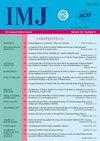克拉霉素- mb联合治疗社区获得性肺炎的临床疗效
Q4 Medicine
引用次数: 0
摘要
肺炎的合理抗生素治疗问题是现代医学中最重要的问题之一。到目前为止,已经确定了决定抗菌治疗最佳质量的大量因素:应将药物的最大功效与最低毒性相结合,并将其适当的成本相结合。为了研究大环内酯类药物克拉霉素静脉注射治疗社区获得性肺炎的临床疗效和治疗耐受性,对20例患者进行了检查。所有患者均有下呼吸道严重感染性病变的临床症状。综合治疗(解毒、溶黏液药物、多种维生素、代谢物)包括“克拉霉素- MB”,剂量为500 mg,每天2次,静脉注射60分钟,持续7 - 10天。抗菌治疗的临床效果是通过肺部炎症过程的活性动态来评估的。为此,我们测定了以下表征炎症过程活动性的临床和实验室参数(温度反应、心动过速、呼吸频率、白细胞增多、未成熟粒细胞数量、红细胞沉降率变化)、疼痛程度、肺部放射学变化。大环内酯“克拉霉素- MB”是一种用于治疗重症社区获得性肺炎的高效抗菌药物。从治疗开始的第三天观察到疾病临床表现的积极动态。“克拉霉素- MB”具有良好的治疗耐受性,其给药方案可使炎症部位维持所需浓度,影响社区获得性肺炎患者的临床和细菌学疗效。关键词:社区获得性肺炎,大环内酯类,“克拉霉素- MB”本文章由计算机程序翻译,如有差异,请以英文原文为准。
"CLARITHROMYCIN-MB" CLINICAL EFFICACY IN COMBINED THERAPY OF PATIENTS WITH COMMUNITY-ACQUIRED PNEUMONIA
The problem of rational antibiotic therapy of pneumonia is one of the most relevant in modern medicine. So far, a large number of the factors have been identified that determine the optimal quality of antimicrobial therapy: the maximum effectiveness with the lowest toxicity of drugs should be combined with their proper cost. In order to study the clinical efficacy and therapeutic tolerability of the drug class of macrolides, clarithromycin for parenteral use in the treatment of patients with community−acquired pneumonia, 20 patients were examined. All the patients had clinical symptoms of severe infectious lesions of the lower respiratory tract. The complex therapy (detoxification, mucolytic drugs, multivitamins, metabolites) included "Clarithromycin−MB", which was administered intravenously for 60 minutes at a dose of 500 mg 2 times a day for 7−10 days. The clinical effectiveness of antibacterial therapy was assessed by the dynamics of the activity of the inflammatory process in the lungs. For this purpose, the following clinical and laboratory parameters characterizing the activity of the inflammatory process (temperature response, tachycardia, respiratory rate, leukocytosis, number of immature granulocytes, change in erythrocyte sedimentation rate), severity of pain, radiological changes in the lungs were determined. Macrolide "Clarithromycin−MB" in a parenteral form is a highly effective antibacterial drug for the treatment of community−acquired pneumonia with severe course. Positive dynamics of clinical manifestations of the disease was observed on the third day from the beginning of therapy. "Clarithromycin−MB" has good therapeutic tolerability, the dosage regimen allows to maintain the required concentration in the site of inflammation, which affects the clinical and bacteriological efficacy of treatment of the patients with community−acquired pneumonia.
Key words: community−acquired pneumonia, macrolides, "Clarithromycin−MB".
求助全文
通过发布文献求助,成功后即可免费获取论文全文。
去求助
来源期刊

International Medical Journal
医学-医学:内科
自引率
0.00%
发文量
21
审稿时长
4-8 weeks
期刊介绍:
The International Medical Journal is intended to provide a multidisciplinary forum for the exchange of ideas and information among professionals concerned with medicine and related disciplines in the world. It is recognized that many other disciplines have an important contribution to make in furthering knowledge of the physical life and mental life and the Editors welcome relevant contributions from them.
The Editors and Publishers wish to encourage a dialogue among the experts from different countries whose diverse cultures afford interesting and challenging alternatives to existing theories and practices. Priority will therefore be given to articles which are oriented to an international perspective. The journal will publish reviews of high quality on contemporary issues, significant clinical studies, and conceptual contributions, as well as serve in the rapid dissemination of important and relevant research findings.
The International Medical Journal (IMJ) was first established in 1994.
 求助内容:
求助内容: 应助结果提醒方式:
应助结果提醒方式:


